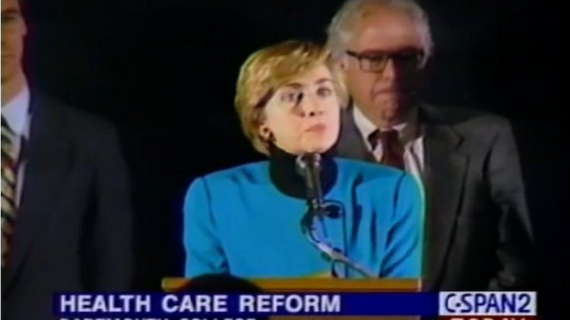"He's Right Behind Me, Isn't He?"
Actually, He's In Front of You, Now.
Last week at a campaign rally, Hillary Clinton asked where Bernie Sanders was when she was working on health care reform in 1993 and 1994. The answer of course was "literally right behind you". This attack in the form of a question was unfair and absurd. But it also shows how poorly calibrated for the modern context Clinton's effort is -- and by "modern context" I mean "the Internet".
In another era -- that is, before anyone could find video of anything, at any time -- this kind of thing might have been extraordinarily successful; but in another era, it was also not possible so completely to circumvent conventional media (whose egregious role as gate-keeper, story-framer, kingmaker, distracter, and purveyor of all manner of things you don't need, can't afford, and really don't want is all too clear).
Without the internet, people would not know Sanders and his record well enough to see just how disingenuous and callow Clinton's attacks have been. But we do have the Internet, and the inevitable immanence of information has made such tactics not just obsolete but self-defeating.
It is essentially only via the Internet that Sanders' message has gotten out, but oh how it has. In fact, Internet use is as sure a predictor of support for Sanders as any. This connection is easy to miss, since internet use also correlates strongly with age. Most pundits have mistakenly assumed it is youth (read: naivete) that drives Sanders' campaign.
Now, with a quickly growing number of vocal Sanders supporters in the African American and Latino communities, it is truly only a matter of time before Clinton's campaign implodes from the mass of its own misinformation. As the latest efforts to discredit Sanders become ever more haphazard and desperate, they bring renewed scrutiny to the previous ones -- which will only accelerate the process. Anyone can find video of anything at any time, after all -- and that includes three days, three months or three presidents ago.
The only real question is, will the word get out in time?
If nonlinear dynamics might give any insight -- and where change depends on crowd-sourced, internet-mediated, virally distributed fact-checking, clearly it would -- then the short answer is, almost certainly. As Malcolm Gladwell showed, that is how transformative change happens -- the tipping point, critical mass, a perfect storm, or the straw that broke the camel's back, choose your metaphor: It means things go quickly once they go. We have already seen the first evidence of this, in Michigan, and more of the same is likely in store on Tuesday.
At least part of the explanation is simple: Most people don't have time or energy to pay close attention until the last possible moment. If you have not done any research of your own, then Clinton seems like the obvious choice; but Sanders' YouTube ouvre can persuade with just a handful of videos. That, along with recent powerful endorsements and a few surprising Sanders primary victories, is all it takes.
This is what conventional thinking has consistently missed: The strongest argument in Sanders' favor is Sanders himself, and the footage is vast and awe-inspiring. For Clinton, the opposite is true; the more you see, the less certain you are. Ultimately, say what you will about being on the right side of an issue right now, most people would prefer to go with the person who got it right the first time around, and took a stand years before it was popular or expedient.
Clinton changed her stances on trade, marriage, and fracking once; there's no reason to suppose she wouldn't change them again.
Clinton's message is, quite literally, tailor-made for conventional media; it plays strongest in that context, where the viewer passively receives it, and only it, in defiance of the past. It fails on social media for that reason, where the viewer seeks information for themselves, and where real people realize what was said before does matter.
Sanders' message, in stark contrast, almost entirely eludes conventional media, and would even if there weren't a more-or-less consistent effort to marginalize him. But he is explosive on social media. That is why he is so beloved: His message circulates because and only because people agree with him, and find him, personally, to be sincere and compelling.
Sanders' entire campaign depends upon his sincerity, consistency and integrity -- he knows it, we know it, he knows we know it, and he knows we know he knows it. Yet it is abundant for the purpose. And somehow, that leads us to have faith not just in him and his message, or even just in ourselves, but also -- and most profoundly -- in each other, and across barriers that may at other times have seemed insurmountable.
That is what revolution is made of.
